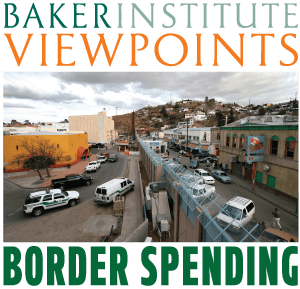In an effort to secure bipartisan support for immigration reform, a bill recently passed by the Senate includes a dramatic increase in border security spending of at least $40 billion. This funding provides for the addition of 18,000 new Border Patrol agents, 700 miles of fencing and expanded use of drones on the U.S.-Mexico border. Facing financial losses from the withdrawal of U.S. forces from Iraq and Afghanistan, the nation’s largest private military contractors are now vying for profitable contracts on the U.S.-Mexico border. Critics have argued that increasing border security spending will further militarize the border and exacerbate existing budget deficits. In this Baker Institute Viewpoints series, six experts respond to the question: What are the implications of expanding border security? Their analyses cover a range of issues — including the legality of drones, the environmental impact of constructing border fencing and the politics of bipartisan compromise — and reveal the complex unintended consequences of increasing spending on border security.
Read other posts in this series:
- Border security and (mis-)management by Tony Payan, fellow in Mexico studies and director of the Mexico Center
- The broader implications of enhancing border surveillance capabilities by Geoffrey Corn, professor at the South Texas College of Law
- Achieving border security: A matter of money or competency? by Guadalupe Correa-Cabrera, assistant professor and chair of the government department of the University of Texas at Brownsville
- Securing the “hyperborder”: U.S.-Mexico border security investments by John Sullivan, lieutenant in the Los Angeles County Sheriff’s Department and senior fellow with Small Wars Journal — El Centro
- Less fence, more task force by Nathan Jones, postdoctoral fellow in drug policy
The current U.S. Senate immigration bill would add $46 billion to border security spending and deploy another 20,000 Border Patrol agents. It is essentially a Democratic bill with some Republican support. President Obama — the “executive point man” for the Democratic party — on the other hand, has taken the position via former Secretary of Homeland Security Janet Napolitano that the border is more secure than ever, even though the president has endorsed the immigration reforms contained in the Senate bill. The Republican House has numerous issues with the Senate bill and currently refuses to even consider it; rather, it seeks to create its own competing bill but has no consensus on what that bill should look like.
There is virtually no agreement between the major political parties, or even between the legislative and executive branch members of the same party, regarding the state of security on the border or such issues as spillover violence and corruption in Mexico. Furthermore, underlying philosophical and ideological divisions exist behind the various views on our border with Mexico, even extending to patterns of governance and life in America itself. In fact, the Senate bill now stalled by the House in many ways represents another flashpoint in the ongoing crisis of consensus in our nation.
This crisis is reflected in broader contextual issues pertaining to the Senate bill. For example, many are raising questions about the meaning of U.S. citizenship. Is it a limited public good or a de facto human right? Or could it possibly be something in between: an “American lifeboat” with only so many seats available? Even then, the consensus breaks down over the rate at which more of the “huddled masses” — in this instance, 11 million illegal Mexican immigrants — should be welcomed aboard as bona fide American citizens, or at least as permanent residents.
Furthermore, differing views on U.S. sovereignty are quite apparent. Many argue that the United States has the right to strictly control who and what crosses its borders. This view is typically reflective of those promoting security concerns regarding spillover cartel violence from Mexico, the scourge of illicit drugs and terrorist infiltration via a porous border. Others would counter that, since Sept. 11, the U.S. has become like a police state in its quest for absolute homeland security, and that further militarization of the U.S.-Mexico border is just another result of an ongoing policy folly.
Then there is the issue of the trade-offs between homeland security and national economic interests, since the latter is perceived by many — especially the farther away they are from the border — as more important. From a Wall Street and Washington perspective concerning what is good for our national economy, the North American Free Trade Agreement (NAFTA), and the emerging global economy that it is subordinated to, typically trumps border security concerns. While NAFTA may greatly benefit American big business — even if our corporations are increasingly multinational in orientation — the forces of globalization are slowly eroding many of the old rights of sovereign states, including those held by the U.S.
Given the present crisis of governance in the U.S., the ongoing budgetary deficits and new sequestration spending cuts, views differ on this massive increase in border security spending. Some view the additional expenditures as crucial to the stabilization of the border; to them, shutting down illegal immigration and potential spillover violence as well as the flow of illicit goods is an essential first step in protecting U.S. sovereignty. Others simply do not see inherent border insecurity issues and would rather take that $46 billion and apply it to different domestic spending programs, while a few others with a more fiscally conservative bent might not even want to allocate those monies to any of these spending regimes.
It is clear that concerns over the border have been politically festering for decades. Our lack of political consensus has again come back to haunt us. It has resulted in well over 1,000, possibly even as high as 2,000, U.S. cities with Mexican cartel operatives entrenched within them. Additionally, it is estimated that more than a million street and prison gang members reside within the United States, with substantial numbers of them integrated into the illicit narcotics industry dominated by Mexican cartels. While the expansion of border security — in essence, a linear defense — is the subject of the current Senate bill, concerns about the entire interior of the nation are not, at present, part of the discussion.
The debate over increased U.S. border security spending could therefore be an irrelevant one, given that the damage may have already been done. The Senate bill appears to provide too much of a solution too late. One of the follies of hierarchical states responding to network-based threats is that they can’t respond quickly enough to a rapidly changing security environment. It is in our national interest to move beyond partisan politics and form a consensus on governance, which we will need in order to attend to the security of the interior as well as the border.
 Robert J. Bunker is a senior fellow with Small Wars Journal — El Centro and an adjunct faculty member in the School of Politics and Economics at Claremont Graduate University. He has written numerous works related to the Mexican cartels and other violent nonstate actors. He can be reached at robert.bunker@cgu.edu.
Robert J. Bunker is a senior fellow with Small Wars Journal — El Centro and an adjunct faculty member in the School of Politics and Economics at Claremont Graduate University. He has written numerous works related to the Mexican cartels and other violent nonstate actors. He can be reached at robert.bunker@cgu.edu.
